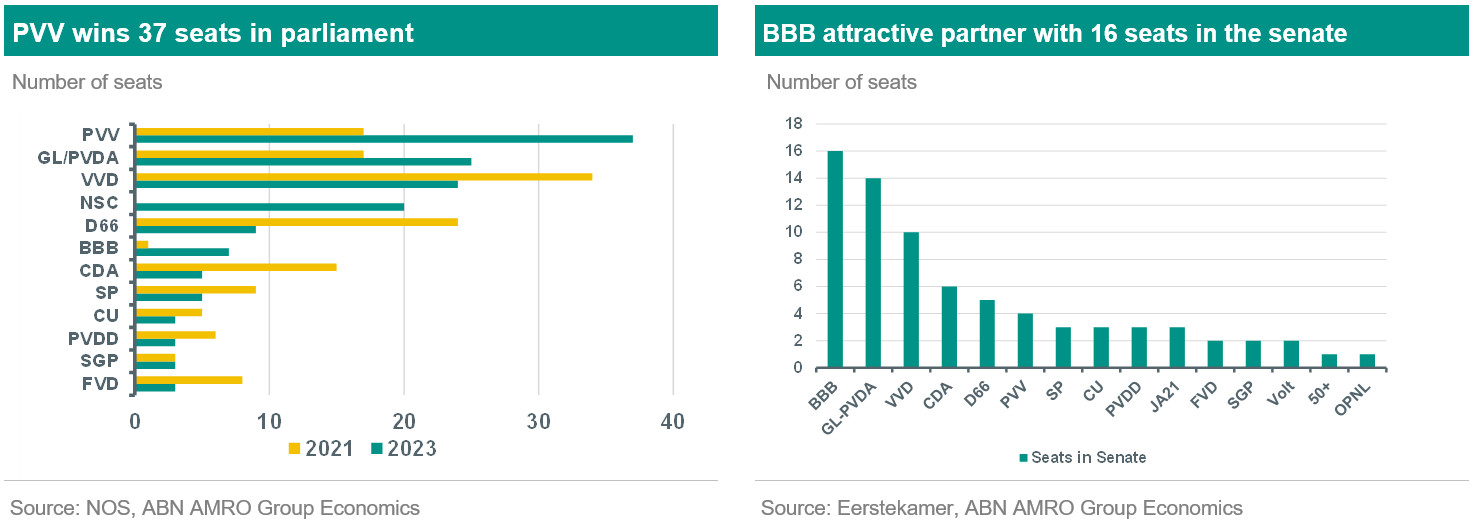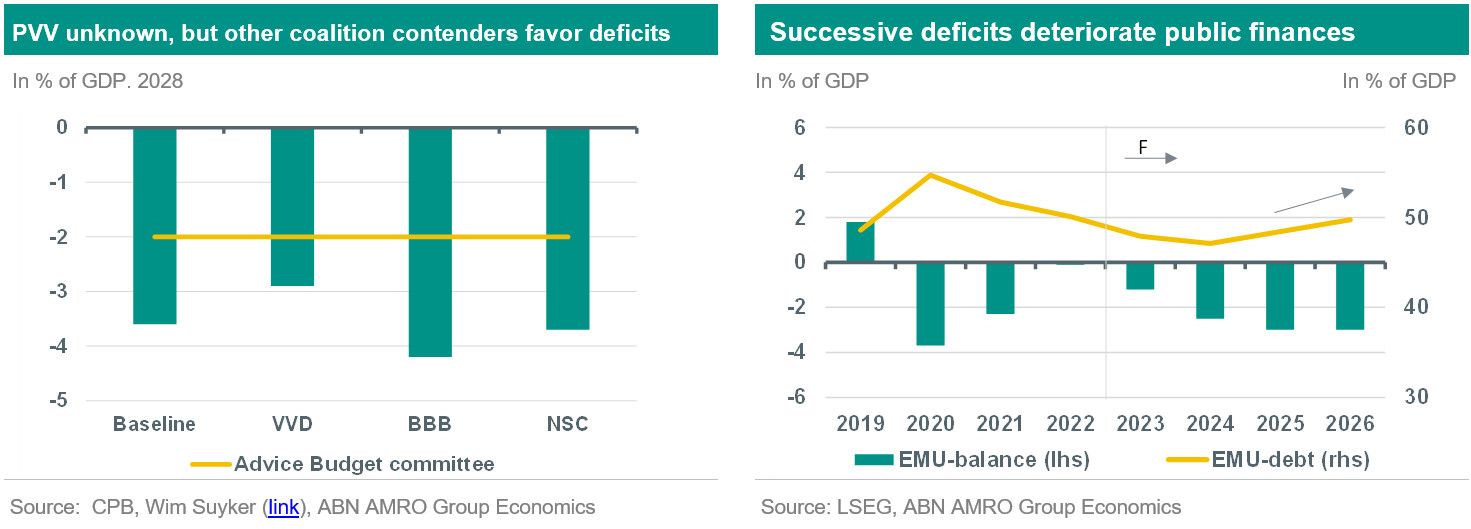Dutch rates focus - Dutch elections won by far-right party PVV

The far-right party PVV won yesterday’s Dutch parliamentary elections, by winning 37 out of 150 seats. A right-wing coalition with VVD and NSC (81 seats) is most likely, possibly including the BBB. Information on the PVV’s policy agenda is scarce. Policy changes are expected in: social security and healthcare spending, climate (less ambition on renewables and more nuclear), Europe (more Eurosceptic) and possibly changes to the current pension reform. As most of the proposed measures are costly, the expanding deficit trend will continue with the likely coalition. The biggest shifts are expected in the area of climate and Europe. Election result will put Dutch pension fund reforms under pressure.

Jaap Teerhuis
Senior Fixed Income Strategist
A right-wing coalition is most likely
Yesterday, elections for the Dutch parliament were held. Based on the most recent outcomes, the PVV – a far-right party with leader Geert Wilders – surprised by winning 37 out of the 150 seats. The three following parties are, respectively, GroenLinks/PvdA (green-labour) with 25 seats, VVD (liberal centre-right) with 24 seats, and new-comer NSC (centre-right) with 20 seats. Compared to previous elections D66 (progressive liberal), VVD and CDA (conservative), lost with 15, 10 and 10 seats respectively. The previous coalition consisting of VVD, D66, CDA and ChristenUnie lost 37 seats in total.
During the provincial elections in March, the new farmer movement – the BBB – won 16 seats in the senate (7 seats in yesterday’s parliamentary elections). The other two largest parties in the senate are GroenLinks/PvdA with 14 seats and the VVD with 10 seats. In the senate, the PVV is relatively small with 4 seats. BBB’s seize in the senate therefore increase the odds that they will be invited to join a future coalition government.
For a majority in the parliament, 76 seats are required. Although various parties have been sceptical of forming a coalition together with the PVV, Wilders will have to look at two of the other three large parties: GroenLinks/PvdA, VVD, and NSC. Based on comments and ideological differences, GroenLinks/PvdA is ruled out which makes a right-wing coalition with VVD and NSC (81 seats) most likely. If you add BBB to this picture – which is attractive due to the position in the senate – the coalition would have 88 seats. However, in the senate this coalition would have 30 seats which is below the required majority of 38 seats. This would limit the coalition’s policy ambitions.
As the PVV was the clear winner of the elections the initiative for the formation process is with them, which in itself could speed up the process. Still as NSC and VVD have expressed concerns regarding some aspects of the PVV party programme a complicated negotiation process might still happen. In any case, 2024 will be well under way before a new cabinet will be installed. Read more on the elections here.

Policy shift likely on Europe, climate and pensions, but a lot remains unclear
A lot remains unclear what policy changes the most likely coalition – VVD, NSC and election winner PVV – will implement. All eyes are on what the biggest party intends, but their information is scarce. The PVV’s party programme is not. The party did not participate in efforts to calculate the economic and/or fiscal impact of their policies. Based on debates and interviews, we can indicate some areas where change is expected: social security and healthcare, climate, Europe and possibly also pensions. As most of the proposed measures are costly, the expanding deficit trend will continue with the likely coalition.
Proposals costly, with deficits likely
One of the few concretes measures the PVV campaigned on was extra spending on healthcare. For instance, getting rid of the mandatory personal healthcare cost contributions (EUR 4.5 bn annually) and free public transport for elderly (roughly 800 mln annually). These are preliminary estimates and might only partly contain behavioural effects which make it more costly. Other measures include a higher minimum wage (costly as state pensions are coupled) and lower levies on fuel. How to pay for these measures remains even more unclear. The PVV advocates for redistributive policies from higher to lower incomes but other possible coalition parties are less in favour of that. As climate spending is likely cut (see below) those funds can be used as well. Looking at the possible coalition parties’ programmes, deficits are also likely.

Big policy shifts are likely in the area of climate and Europe
The PVV will likely be in favour of cutting spending on climate and energy-transition related projects. As the biggest part in a coalition of parties that are generally less ambitious on decarbonisation, this is a real possibility. This would mean a significant policy change as the current coalition set ambitious climate targets with spending allocated accordingly. The PVV is most vocal about cutting renewable energy investment. With NSC and VVD in favour of nuclear energy there is a possible shift away from renewables to nuclear.
Next to climate, Europe is an area where all parties of the possible coalition favours a less accommodative policy. The big win of D66 during previous elections meant the coalition took on a more favourable position on European reforms. The PVV, outspoken anti-Europe and even flouting the idea of a Nexit (Netherlands Exit), can count on support on its Eurosceptic sentiment from VVD and NSC. The NSC and the VVD are not in favour of a Nexit but are critical of Europe. The new coalition therefore is likely to run a different – perhaps more antagonistic - course than the more accommodative course the current government had run.
Considering the European Parliament elections in May 2024, these elections might be a canary in the coal mine with a larger chance of shifts further to the right. However, even if it does, as it stands, the centrist parties (mainly the EPP) are so firmly dominating that one election round is unlikely to put them out of power. This means that at this point it seems that the Green Deal is likely to remain intact.
Election result will put Dutch pension fund reforms under pressure
In June this year, the Dutch Senate approved the new pension law and the pension sector is now in the transition phase due to a change from a Defined Benefit into a Defined Contribution framework. In the election program, the PVV and the BBB both mentioned that they want to reverse the law completely. Furthermore, the NSC has announced in its program that it wants to adjust the law on some important points. Based on this, it is expected that the pension fund reforms will be a topic that will be negotiated during the formation of the new coalition. Obviously, a change in the law or even a stop of the transition will have a significant impact on the market but at this moment it is too early to estimate what the possibility of these scenarios will be.
Market opened cautiously this morning
At the opening of the market this morning, the liquidity in Dutch bonds was limited, as banks had either very wide quotes on screens or did not quote at all. In general, the 10-year DSL traded around 1bp cheaper compared to its German peer.
